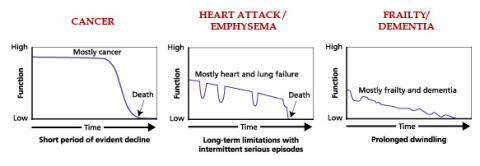
How do you want to die?
“Would you prefer to be old when it happens?” she then asked.
This time the response was swift and sure, given the alternative.
Then Dr. Lynn, who describes herself as an “old person in training,” offered three options to the room. Who would choose cancer as the way to go? Just a few. Chronic heart failure, or emphysema? A few more.
“So all the rest of you are up for frailty and dementia?” Dr. Lynn asked.
And then she showed the audience – health policymakers, legislative staff, advocates for the aged and for family caregivers, etc. mostly at middle ages – these graphs:

Dealing with one’s own mortality is definitely not a pleasant thing – it’s not all fun-and-games, and many of us would probably just turn a blind eye to it, avoid it and pretend it doesn’t exist, so much so that death is in many ways still a conversational taboo. You may ask someone about his family, his career, his life in general, but never about his death. When conversation hits a recently-deceased family member, the standard is just to say “Oh I’m sorry” and to just fudge on from there.
Handling (on-behalf) a sick loved-one’s can prove to be an even more difficult dilemma. Family members with sick elderly often find themselves staring down extremely tough decisions, tangled amongst the vines of exorbitant medical costs, guilt, dignities, care-responsibilities, quality-of-life, etc.
As medical treatment advances we are seeing ways of intervention that can put more time into our lives – but it doesn’t necessarily put more life into our time. At some point we would need to ask ourselves how do we want to age – and die?
[via NYTimes – The New Old Age]

